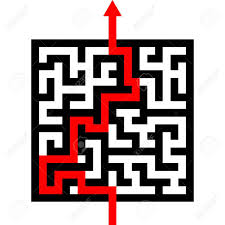 I write a lot of drafts. Mine are usually short, since I write mostly short stories, and the first is often longer than the second, the second longer than the third, and so forth. (I tend to overwrite a bit.) I should mention, too, that my first draft is usually terrible. That doesn't bother me--nobody but me is going to see it anyway--and I think it's better to get as much as possible down on paper than to leave something important out.
I write a lot of drafts. Mine are usually short, since I write mostly short stories, and the first is often longer than the second, the second longer than the third, and so forth. (I tend to overwrite a bit.) I should mention, too, that my first draft is usually terrible. That doesn't bother me--nobody but me is going to see it anyway--and I think it's better to get as much as possible down on paper than to leave something important out.I also like to write a first draft all the way through, without stopping to do a lot of analysis on the way. I've never been one of those people who "edit as they go." I don't even pay much attention to punctuation or spelling or grammar in those first drafts. They truly are rough.
A writer friend of mine insists that she doesn't have to deal with drafts--and not because she keeps the windows closed. She just makes every page as perfect as it can possibly be before going on to the next. Her reason for doing that is simple, she says: when she's written the final page of her book or story, she's finished; no corrections or subsequent drafts are needed. The reason I don't do that is simple, too: I might later decide to change something in the plot, or add another character, or take one out, or change the POV. If that happens, and if I've already tried to polish the first scenes and pages to a high gloss, that means I'll have to go back and re-edit what I've already edited. I'm not super-efficient and I'm sure not smart, but I'm smart enough not to want to do the same job twice. Besides, getting the whole thing down on paper, start to finish, gives me a warm and comfortable feeling about the project. It makes it something I know I can handle.
I occasionally don't even have names finalized when I do a first draft. My hero/heroine might be H, my villain might be V, the hero's best friend might be BF. These are just place-holders, so I can come back later and fill in the names. Same thing goes for locations or situations that will require detailed research, or scenes that need a lot of description--I don't spend the time to do that in first drafts. I'm more concerned about plot points and the flow of the story. (Not that it matters, but I've found it's fairly easy for me to write beginnings and endings. It's the middles that are hard. Maybe that's why I write shorts instead of novels.)
Readers have often asked me how many drafts I write, of a short story, The answer is, it varies. It also depends on how you define "draft." If you go through a work-in-progress and change only one sentence, is that new version another draft? As for me, I don't usually do many extensive re-writes, but I do go back through the manuscript a few times after a third- or fourth-draft polishing and see if there's anything more that needs correcting or fine-tuning. But, as all writers know, you don't want to go over it too much. When you can read through what you've done several times and not find anything glaring, you're probably finished. If you persist too long, you'll get to the point where changes might make things worse instead of better.
How about you? Are you a draft-dodger, and just edit everything as you go? Or do you rehearse and shoot several takes before you print the film? If so, how many drafts does that usually involve? How do you decide how many drafts is too many? How detailed is your first draft? Do you ever outline beforehand, either mentally or on paper? Do you ever write the ending first?
I once heard that a novelist has to be a good storyteller and a short-story writer has to be a good craftsman. Maybe both have to be good draftsmen.
Now, I wonder if I need to do more editing on this column . . .
